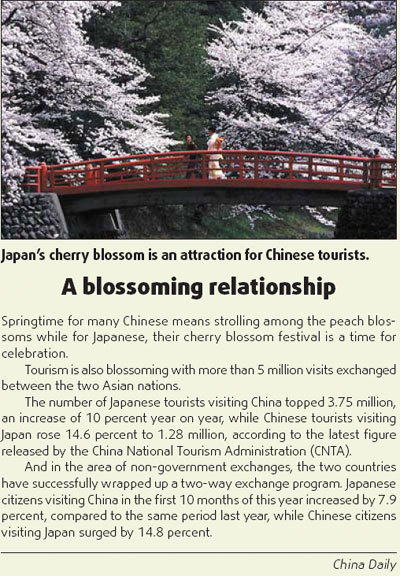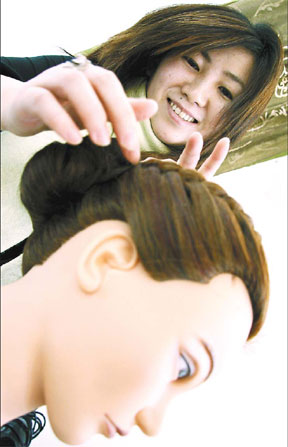Iwaki's shear magic
Iwaki Tatsuko combines an eye for antique furniture with a penchant for chic and simplicity. A delicate tea table invites one not just to partake of a cup of coffee and a slice of freshly-baked cheesecake, but also draws attention to the engraved designs of flowers under the glass tabletop.
|
Iwaki Tatsuko weaving her magic on a dummy in an effort to create a fresh hairstyle. Wang Jing |
Against the wall stands an elegant wooden desk bought in Inner Mongolia autonomous region, the hometown of Iwaki's Chinese husband. It features carvings of two qilin (Chinese mythological unicorn), with the drawer handles resembling golden leaves. On the table are three jars, a vase of flowers and a tiny, wooden, three-legged stool.
Hanging on one wall is a miniature wooden cabinet from South China, on whose shelves sit several blue-and-white porcelains.
On the other side of the room, Iwaki fills a modern bookshelf with dozens of Japanese fashion magazines and cartoon books, and plastic bottles of different shapes and colors.
This is the family hair salon of which the Japanese woman in her late 30s, and mother of three, is co-owner and top stylist.
Her customers are mostly Japanese families living in the high-end communities near Chaoyang Park. The price of haircutting and hairstyling ranges from 100 to 1,000 yuan ($14-140).
It is hard to distinguish her, always wearing a warm smile, from other Chinese women, as she speaks fluent Chinese with a slight Northeastern accent, which comes from her Chinese parents-in-law.
"I was 100 percent unhappy with the news that my husband would have to move to Beijing five years ago," she recounts. "The feeling was worse than when my husband was dispatched from Japan to Hong Kong in 1991.
"I had never been to Hong Kong but had seen many Hong Kong action films in Japan. It was all about frightening gangsters and gunfights. I was unsure of what I would encounter," she says.
Iwaki stayed in Hong Kong for about seven years. "It turned out to be a great time. People were open-minded and warm-hearted. They were from different parts of the world, representing a variety of cultures, and this was particularly good for my kids."
At that time, she stopped by Beijing every time her family returned to Inner Mongolia. But the city didn't leave with her a good impression, thanks to the bad air, spitting and countless bicycles on the streets.
It took her a year to get accustomed to the pace of Beijing. "It has changed and is much better now. But I still prefer Baotou (a major city in Inner Mongolia), where my husband grew up. It is clean and well constructed. I've traveled across the autonomous region. The grassland always fascinates me."
Iwaki started hairstyling for others at home when she lived in Hong Kong. Before that, she had been in the business for eight years in Japan. It was her older son who initiated the idea of going pro.
"Shortly after we moved to Hong Kong, my son met another Japanese boy in a store. He told the boy's mother that I was a hairstylist, and they could come to me if they needed a haircut," she says.
News of her home-based salon spread in the Japanese community through word of mouth. She received one family a time, and served the parents first while their children played games or read comics. "Many mothers found it troublesome to go to a salon as they couldn't leave their children alone at home. It occurred to me that opening a family hairstyle salon might solve the problem. Parents and children could have their hair done together without disturbing other customers," she says.
Her family salon continued to be popular with the Japanese community even after she moved to Beijing. She began entertaining single customers - on reservation - and some of them are Chinese who enjoy both her styling and her cakes.
She says that many Japanese couldn't find a satisfying hairstylist in Beijing and used to have their hair done only when they went back to Japan on holiday. This situation has been improved in recent times, with some Japanese hair salons opening chain stores in China.
Iwaki says she has also been to some hair salons in Beijing and notes that they are very different from those in Japan. For instance, a lot of hairstylists in Japan, especially those serving female customers, are women. This is not so in China, she says. Students of hairstyle schools in Japan normally spend most of the time on theory and perfecting their basic skills. A new hand in the salon must pass several strict tests before becoming a real hairstylist.
"That's why hairstyling is recognized as a highly respected profession in Japan," she says.
She says more and more Chinese youth seem to be interested in studying hairstyling in Japan, and some came to her for help. "I once interviewed a boy who wanted to study with me. He told me he had been a barber for six years. But he couldn't even trim the edges even," she says.
"I am told that many hairstylists recommend that their customers have their hair curled and dyed, a strategy to make money. I think a qualified hairstylist should give her skills the top priority. He or she should focus more on creating a natural hairstyle than on anything else."
(China Daily 04/11/2008 page19)















